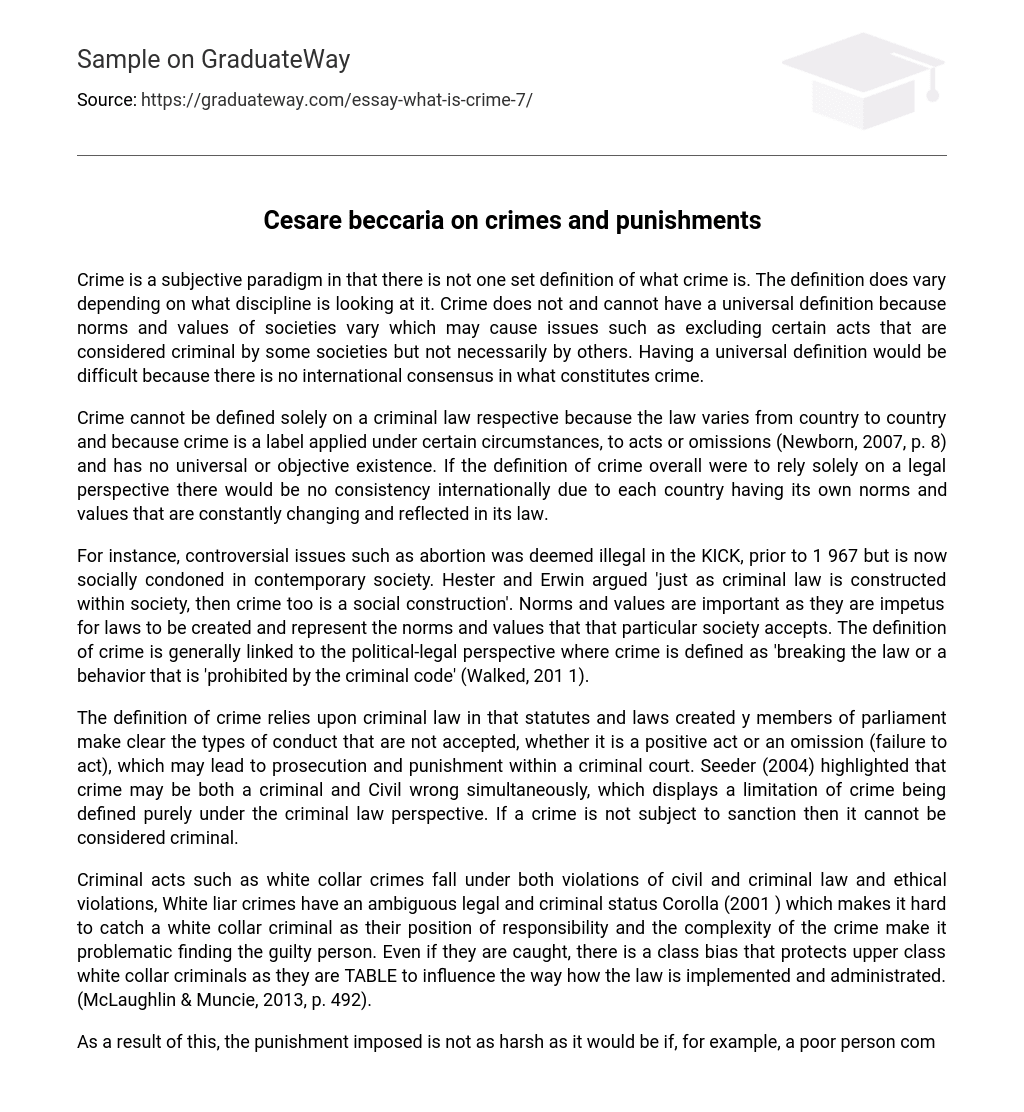Crime is a subjective paradigm in that there is not one set definition of what crime is. The definition does vary depending on what discipline is looking at it. Crime does not and cannot have a universal definition because norms and values of societies vary which may cause issues such as excluding certain acts that are considered criminal by some societies but not necessarily by others. Having a universal definition would be difficult because there is no international consensus in what constitutes crime.
Crime cannot be defined solely on a criminal law respective because the law varies from country to country and because crime is a label applied under certain circumstances, to acts or omissions (Newborn, 2007, p. 8) and has no universal or objective existence. If the definition of crime overall were to rely solely on a legal perspective there would be no consistency internationally due to each country having its own norms and values that are constantly changing and reflected in its law.
For instance, controversial issues such as abortion was deemed illegal in the KICK, prior to 1 967 but is now socially condoned in contemporary society. Hester and Erwin argued ‘just as criminal law is constructed within society, then crime too is a social construction’. Norms and values are important as they are impetus for laws to be created and represent the norms and values that that particular society accepts. The definition of crime is generally linked to the political-legal perspective where crime is defined as ‘breaking the law or a behavior that is ‘prohibited by the criminal code’ (Walked, 201 1).
The definition of crime relies upon criminal law in that statutes and laws created y members of parliament make clear the types of conduct that are not accepted, whether it is a positive act or an omission (failure to act), which may lead to prosecution and punishment within a criminal court. Seeder (2004) highlighted that crime may be both a criminal and Civil wrong simultaneously, which displays a limitation of crime being defined purely under the criminal law perspective. If a crime is not subject to sanction then it cannot be considered criminal.
Criminal acts such as white collar crimes fall under both violations of civil and criminal law and ethical violations, White liar crimes have an ambiguous legal and criminal status Corolla (2001 ) which makes it hard to catch a white collar criminal as their position of responsibility and the complexity of the crime make it problematic finding the guilty person. Even if they are caught, there is a class bias that protects upper class white collar criminals as they are TABLE to influence the way how the law is implemented and administrated. (McLaughlin & Muncie, 2013, p. 492).
As a result of this, the punishment imposed is not as harsh as it would be if, for example, a poor person committed overt theft. This reinforces Walker’s definition of crime, ‘that behavior so defined as criminal by agents and activities of the powerful’ (Walked, 1990, p. 5) as it highlights that the elite work within their interests and have the power to more or less get away with their crimes. Alternatively, Selling (1938) argued that the concept of crime should be extended beyond legal violations to violations of moral and social codes (Muncie & McLaughlin, 2001, p. 12).
This approach incorporates both illegal acts and omissions and immoral acts that would remove the ambiguity tit the legal status with white collar crimes. Crime is heterogeneous in that it ranges from crimes such as theft, burglary to child sexual abuse, child murder, serial killing to genocide. However, acts that are considered criminal have nothing in common apart from the fact that they are violations of law. Element (1972) compared different societies and concluded that murder, rape and theft were universally condemned despite the difference legal systems and societal values.





